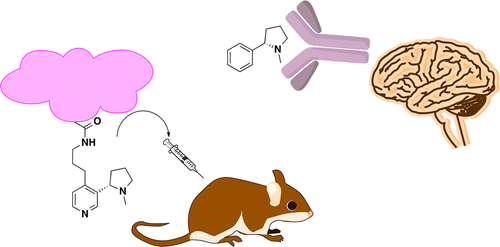Nicotine vaccine delays the drug's effects in mice

Many people who smoke want to quit, but the urge to light up is often irresistible. An effective vaccine to help people kick the habit once and for all has been elusive. But now, scientists report in ACS' Journal of Medicinal Chemistry a new vaccine design that could help achieve this goal.
Smokers who want to quit have a few tools to turn to. There are nicotine patches and gum, but they're not always effective. There are drugs that target nicotinic acetylcholine receptors, but these come with a risk for nasty side effects such as hallucinations, depression and severe mood swings. Vaccines that target the nicotine molecule itself would be an alternate strategy. Two candidates advanced into clinical trials recently. They ultimately failed—but not without first yielding clues as to how scientists could improve upon them. Individuals in the trials who produced the highest levels of anti-nicotine antibodies were more likely to abstain from smoking for over six months. Kim D. Janda and colleagues wanted to build on this lead.
The researchers designed a new vaccine that could increase the number of antibodies that could attach to nicotine molecules. Testing in mice found that the vaccine delayed the effects of nicotine within the first 10 minutes after injection. They also found that treated mice had lower concentrations of nicotine in their brains, which is where the drug exerts its effects. The researchers say future efforts will focus on further refining the vaccine formula to get it ready for potential clinical trials.
More information: Nicholas T. Jacob et al. Investigations of Enantiopure Nicotine Haptens Using an Adjuvanting Carrier in Anti-Nicotine Vaccine Development, Journal of Medicinal Chemistry (2016). DOI: 10.1021/acs.jmedchem.5b01676
Abstract
Despite efforts to produce suitable smoking cessation aids, addiction to nicotine continues to carry a substantive risk of recidivism. An attractive alternative to current therapies is the pharmacokinetic strategy of antinicotine vaccination. A major hurdle in the development of the strategy has been to elicit a sufficiently high antibody concentration to curb nicotine distribution to the brain. Herein, we detail investigations into a new hapten design, which was able to elicit an antibody response of significantly higher specificity for nicotine. We also explore the use of a mutant flagellin carrier protein with adjuvanting properties. These studies underlie the feasibility of improvement in antinicotine vaccine formulations to move toward clinical efficacy.

















